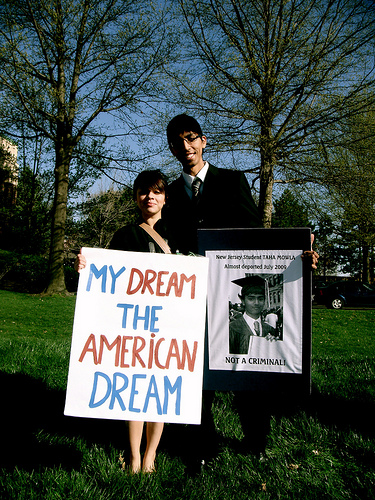After months of intense debate over the Obama administration’s efforts to revamp our immigration system, Senate Majority Leader Harry Reid has made a decisive, though piecemeal, move on immigration reform by adding the Development, Relief and Education of Alien Minors (DREAM) Act as an amendment to the defense authorization bill.
The proposed DREAM Act would provide a path to citizenship for immigrant youth who commit to two years of military service or college. It would potentially grant legal permanent status to 825,000 young people, according to the Migration Policy Institute.
Reid’s announcement this week is just the latest example of a growing, nationwide backlash against the rising anti-immigrant sentiment in this country. As more anti-immigrant measures are blocked or reviewed by federal courts, and many others are flatly rejected by local governments, federal lawmakers and reform advocates are once again making a strong push for comprehensive immigration reform.
DREAM Act paves way for new comprehensive reform bill
As Elise Foley of the Washington Independent reports, Sen. Bob Menendez (D-NJ), Rep. Nydia Velazquez (D-NY) and Rep. Luis Gutierrez (D-IL) have all come out in favor of Reid’s decision, all while insisting that comprehensive reform is still essential. At an immigration forum attended by more than 500 reform advocates yesterday, Menendez announced plans to introduce an immigration reform bill in the Senate, while Gutierrez announced plans to ask Obama to freeze non-criminal deportations until immigration reform has passed.
Dream Act vote unites immigration reform advocates
In particular, Guttierez’s support for passing the DREAM Act independent of comprehensive reform is a change of pace. Guttierez previously stood opposed to “piecemeal” reform efforts. The DREAM Act, which has been heavily lobbied by grassroots activists and has proven much more popular than any other proposed reform bill, was a point of contention among reform activists. While prominent pro-immigrant groups called for including the DREAM Act in a comprehensive reform package, DREAM activists decided to chart their own course.
Gutierrez’s change of heart may have been prompted by widespread frustration on the part of reform advocates, who had hoped to make headway on comprehensive immigration reform as early as last year.
He’s not alone. As Julianne Hing notes at ColorLines, the Congressional Hispanic Caucus (CHC) quickly endorsed Reid’s decision, despite its past criticisms of DREAM activists’ unilateral approach. The CHC was careful to downplay the intra-movement tension that has come to define the DREAM Act, in favor of presenting a unified front on immigration reform. For DREAM activists, the endorsement is a welcome move, and gives credence to Reid’s decisive move on the bill.
For local governments, cost outweighs ideology
Meanwhile, the anti-immigrant movement is starting to lose steam, as more localities are outright rejecting popular anti-immigrant measures. They fear inviting costly lawsuits and garnering unwanted attention from the federal government. AlterNet’s Seth Hoy reports that Tomball, Texas and Fremont, Nebraska are the latest cities to opt against strict anti-immigrant enforcement ordinances. Similarly wary of attracting exorbitant lawsuits, legislators in Ohio and Idaho are feverishly revising their own, once-embraced versions of Arizona’s SB 1070.
They have cause for concern. While Arizona has managed to collect $3.6 million in donations to defend SB 1070, other state governments haven’t been so lucky. One city in Texas has already spent $3.2 million defending its three anti-immigrant ordinances.
Federal courts pull no punches on anti-immigrant laws
In another major blow to the anti-immigrant crusade, a federal appeals court blocked an infamous Hazleton, Pennsylvania law that bred copycat bills in several other states. If enforced, the law would have penalized landlords and businesses who rented to or employed undocumented immigrants.
On the same day, the Supreme Court set a date to hear the case against another Arizona law that threatens to penalize businesses for employing undocumented immigrants. The 2007 Legal Arizona Workers Act, which is based on the Hazleton law, is the first anti-immigrant measure to ever come before the Supreme Court—and with good reason, as the law continues to have a devastating impact on scores of undocumented workers.
As I note for Campus Progress, the Arizona law is one of Sheriff Joe Arpaio’s primary tools in his own crusade to rid Maricopa County of unauthorized immigrants. The law contains a provision stipulating that undocumented immigrants who obtain employment with the use of a fake ID are guilty of committing a class 4 felony which, in Arizona, means automatic jail without bail. This has contributed to Arizona’s notoriously high rate of immigration-related prosecutions and deportations.
But, if the Hazleton victory is any indication, the Supreme Court case could mean that undocumented workers in Arizona can look forward to a reprieve from Arpaio’s worksite raids sometime in the near future.
Of course, with elections coming up, immigration hawks aren’t going to give in anytime soon. Yet, with anti-immigrant legislation getting blocked left and right, and the DREAM Act gaining steam among newly-unified reform activists, one has reason to be optimistic.
This post features links to the best independent, progressive reporting about immigration by members of The Media Consortium. It is free to reprint. Visit the Diaspora for a complete list of articles on immigration issues, or follow us on Twitter. And for the best progressive reporting on critical economy, environment, and health care issues, check out The Audit, The Mulch, and The Pulse . This is a project of The Media Consortium, a network of leading independent media outlets.




